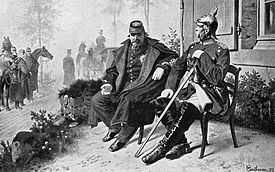Army of Châlons

The Army of Châlons was a French army which took part in the Franco-Prussian War of 1870–71. It was formed in August 1870 from parts of the Army of the Rhine not blockaded at Metz. It ceased to exist when it capitulated on September 2, 1870 after being encircled and defeated at Sedan.
History
After its defeat at Gravelotte, Marshal Bazaine's Army of the Rhine retreated to Metz where it was besieged by over 150,000 Prussian troops of the First and Second Armies (Siege of Metz). Emperor Napoleon III, along with Marshal MacMahon, formed the new French Army of Châlons to march on to Metz to rescue Bazaine. With Napoleon III personally leading the army as its nominal commander, with Marshal MacMahon in actual command, they led the Army of Châlons in a left-flanking march northeast towards the Belgian border in an attempt to avoid the Prussians before striking south to link up with Bazaine.
The Prussians, under the command of Helmuth von Moltke, took advantage of this maneuver to catch the French in a pincer grip. Leaving the Prussian First and Second Armies besieging Metz, Moltke took the Prussian Third Army, led by the Crown Prince of Prussia, and the newly formed Army of the Meuse under the Crown Prince of Saxony northward where they caught up with the French at Beaumont-en-Argonne on 30 August 1870. After a hard-fought battle with the French losing 5,000 men and 40 cannons in a sharp fight, they withdrew towards Sedan. The intention of the French was to rest the army, which had been involved in a long series of marches, resupply with ammunition and then retreat, rather than giving battle in the town. The French however were soon isolated and trapped by the Prussian armies in the town. The following battle of Sedan ended on September 2, 1870 with the capitulation of the army and with Napoleon III, a wounded MacMahon and 103,000 soldiers being lead away as prisoners of war.
The defeat at Sedan and the capture of Napoleon III sealed the doom of the Second Empire, which was soon overthrown. The defeat at Sedan and the capitulation of Bazaine at Metz two months later cost France its most experienced soldiers and, although the war would go on until early 1871, made ultimate defeat inevitable.
References
- Howard, Michael, The Franco-Prussian War: The German Invasion of France 1870–1871, New York: Routledge, 2001. ISBN 0-415-26671-8.